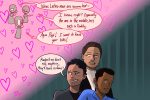Growing up, whether it be from watching television shows or reading fictional books, people develop unrealistic expectations — or should I say, specifically, stereotypes — of certain college majors.
However, as with all stereotypes, common perceptions about college majors are rooted in caricature and are, therefore, largely inaccurate. If you go to college expecting every computer science major to wear a pocket protector and carry a calculator, you’re probably going to make very few friends in your math classes.
Before you get to campus and proceed to inappropriately judge everyone around you, it’s important to understand the inaccuracy of most of these generalizations. Here are the most common college-major stereotypes debunked.
Art Majors
There is a common stereotype that all artists are born talented, but this is a huge misconception: just like with any other skill, you must practice, practice, practice. Just as some artists are born with a head start, many others begin their artistic careers at the very bottom and have to work their way up to the top.
In addition, many non-artists often believe that those in the visual arts field can draw anything, which is unquestionably false. In actuality, artists’ styles span a broad range, one that is based on medium, form, influence and any number of other factors — in other words, being an artist in no way means that you can draw.
Plus, even when you’re dealing with an artist who specializes in painting, sketching or drawing, they may have developed a signature style so well defined that it precludes them from being able to produce anything outside their aesthetic.
Finally, those outside of the arts might expect art majors to be able to produce a masterpiece in a short period of time, which is a common but insulting mistake. Let’s be real, perfection takes time.
English Majors

Many people believe in the fallacy that all English majors have, at one point, participated in a series of Spelling Bee competitions, thus immediately assuming that their spelling errors illustrate their failure in the field, which is a misconstrued belief.
Along with that, others assume that English majors bear an incompetency in math. As an English major, I admit I tend to joke about my inability to count. Undeniably, English majors possess the potential as well as ability to count or solve mathematical equations.
Math Majors
In the “wonderful, representative media,” directors and producers frequently cast Asian actors and actresses as the geeky math nerds. Obviously, not all math majors are Asian, as one’s ethnicity does not dominate a major. At the same time, there is a common stereotype that all math majors solely solve equations for a living, but they actually write proofs and essays on mathematical theories.
Another misconception is that they are able to solve any mathematical equation within the blink of an eye, but they actually need to take their time in order to calculate the entire problem accurately and correctly.
Education Majors
Not all education majors were just seeking to choose the “less difficult” major nor were they aiming for a “professional babysitter” status. Countless people, who consider becoming teachers, fall into the latter category because they believe standing up and talking to a room filled with adolescents is a simple task.
They become teachers without having any interest in interacting with children, eventually posing a detrimental risk to the youth, as they are waiting on their paycheck and counting down the days — or even years — to their retirement.
In reality, the job of a teacher is more than just babbling about a lesson plan; teachers are assisting parents in nurturing children, helping them to develop and setting a prime example of how to act and behave in society. As numerous people buy into the belief that teachers have easy jobs, educators, unfortunately, have become underappreciated and unrecognized for their duties.
Computer Science Majors
The traditional world of media often displays only men as being able to possess the capability to have a place in the STEM field — or, in this case, computer sciences in particular.
Research at the University of Washington’s Institute for Learning and Brain Sciences discovered two common stereotypes that have driven women away from pursuing computer science degrees: the impression that only men who endlessly code belong in the field and that only men have the competence to hold a position in the scientific and mathematical fields.
These common stereotypes strongly suggest how necessary it is to reform classrooms as well as change what’s portrayed in the media, since computer science is for all people, regardless of gender.
Biology Majors

Commonly, people outside of the science fields assume that all biology majors are uptight, cut-throat and not as social compared to the rest of the majors because they are intensely focused on their grades. This is a terrible misconception since biology majors do have lives outside of the lab and a person’s uptightness is more of a depiction of their personality rather than representative of the major itself.
Surely, I see this as a misconception since I have friends who are biology majors and they are constantly going out. I even see their Snapchat stories filled with countless nature scenes and Instagram-worthy food pictures.
Additionally, going to medical school and becoming a doctor are not the end goals for all biology majors. Curing cancer may not even be on their “To-Do” list. In some cases, biology majors, along with chemistry majors, start their own make-up companies or become renowned chefs in their towns.
Food science, believe it or not, has a heavy concentration in the fields of biology and chemistry. Aside from that, there are many more possibilities on what science majors can do, like the saying goes, “the sky’s the limit.”
Judging someone based on their major, rather than actually asking them “What inspires you?” or “What are your hobbies?” is awful since it’s no different from judging someone by their appearance, which is incredibly shallow.
Unquestionably, some people do choose the majors that resemble their interests, but there are also people who have chosen their major because it will meet their desired standard of living. Of course, that may be a different issue itself.
Why do something for the rest of your life solely for the money? Why not do something that you love — something that at least piques your interest — so you won’t have to count down the days until your next vacation or retirement?
However, most young adolescents blindly choose a major that can ultimately change their lives in the long run. After graduating from high school, they choose one major that they think they may like, but it turns out that it wasn’t what they had hoped for.
After countless times of changing their majors and they still can’t seem to find what they would like to do, they end up choosing a major that will help them the most financially. Everyone has a different situation and reason for choosing their major.
Just follow this golden rule: Don’t assume you know who a person is based on their major since you have not been in their shoes.

















